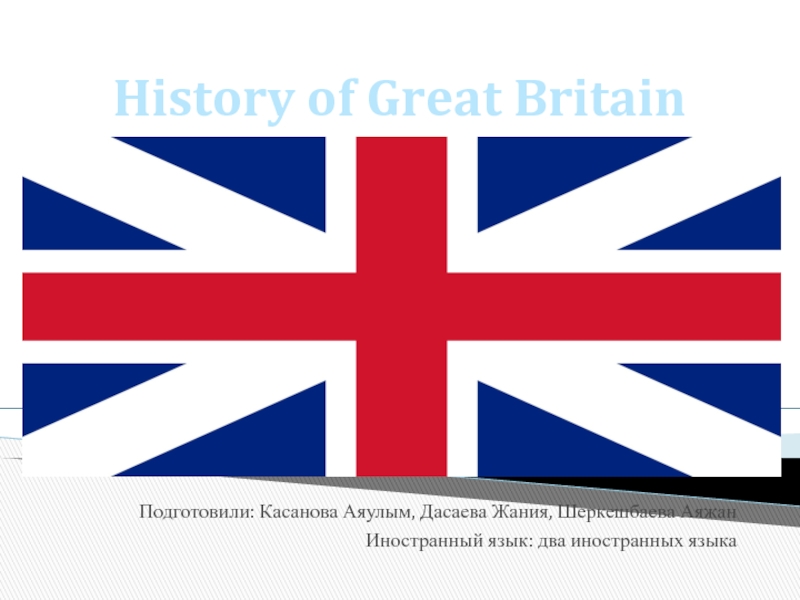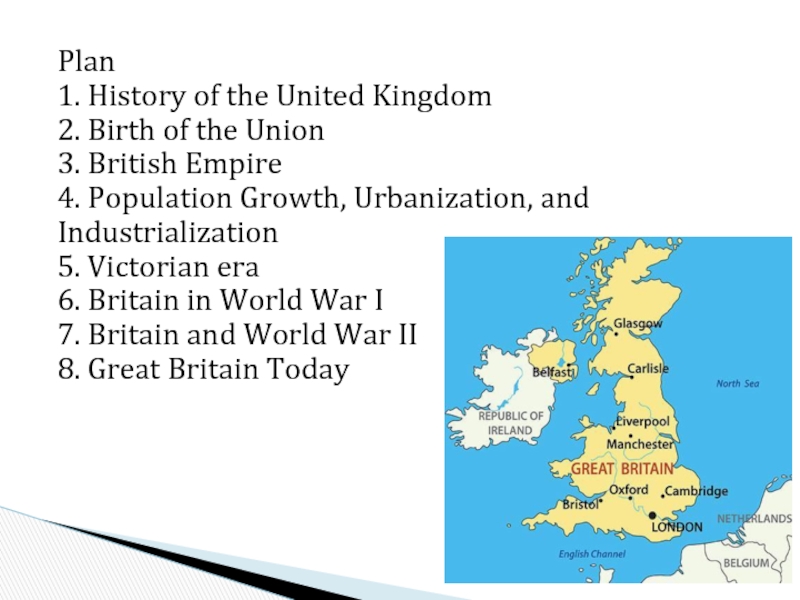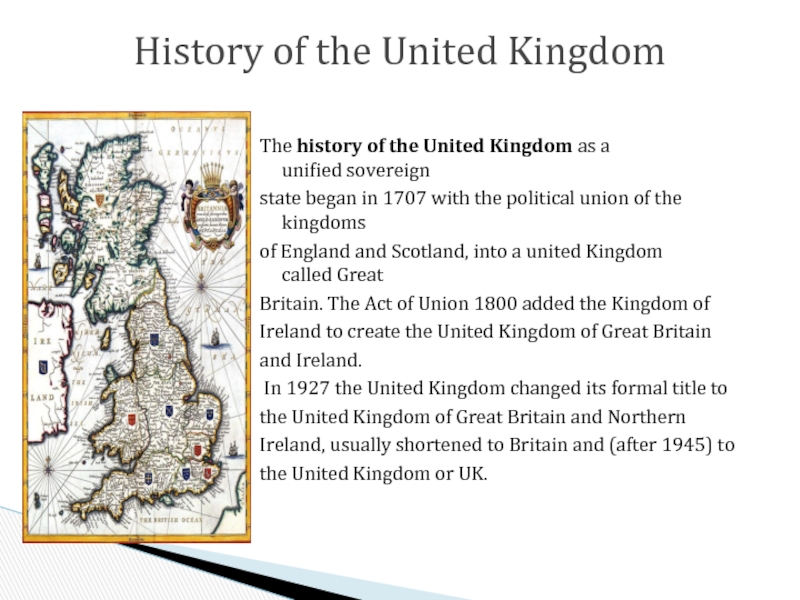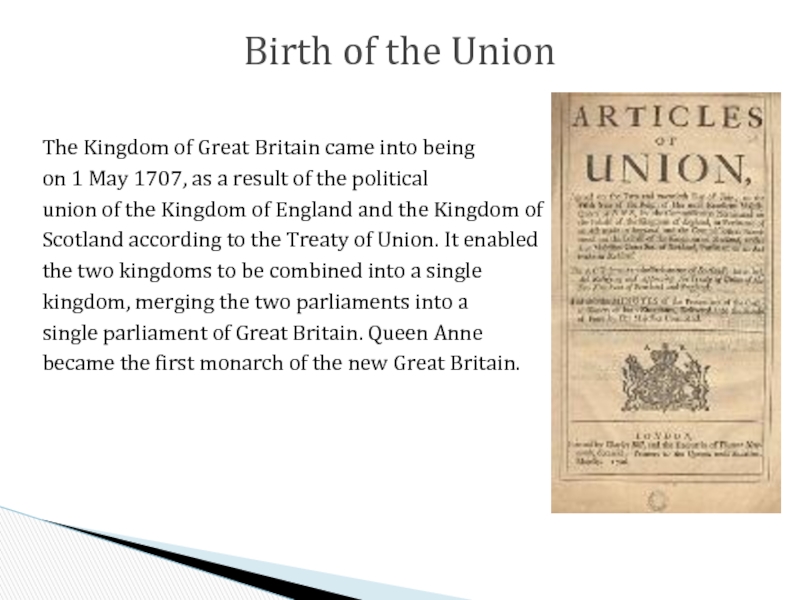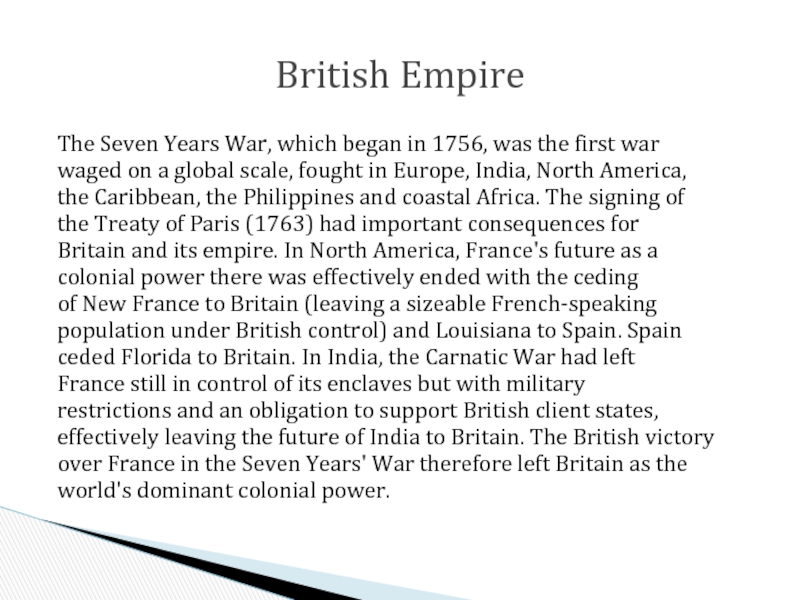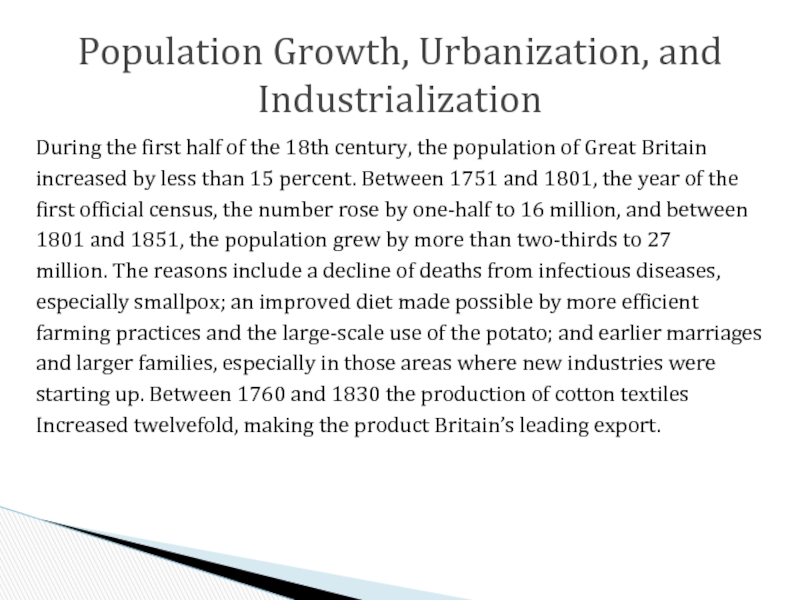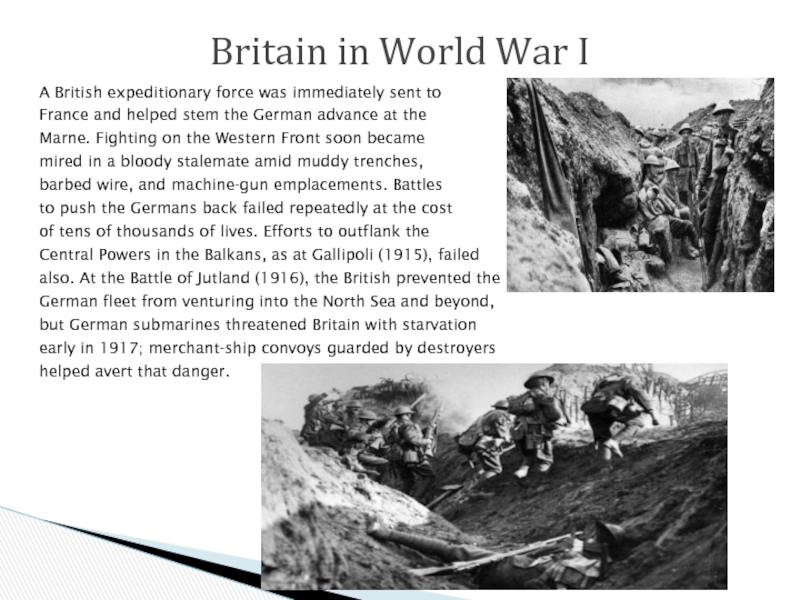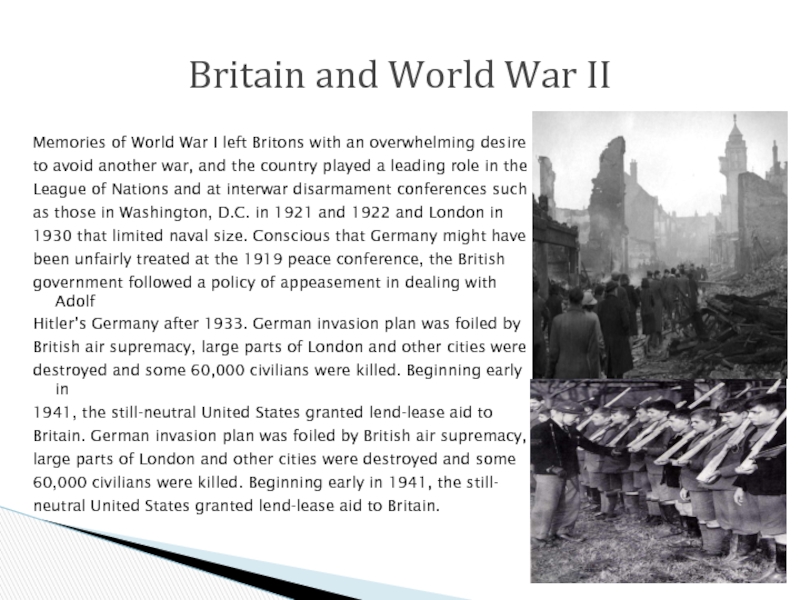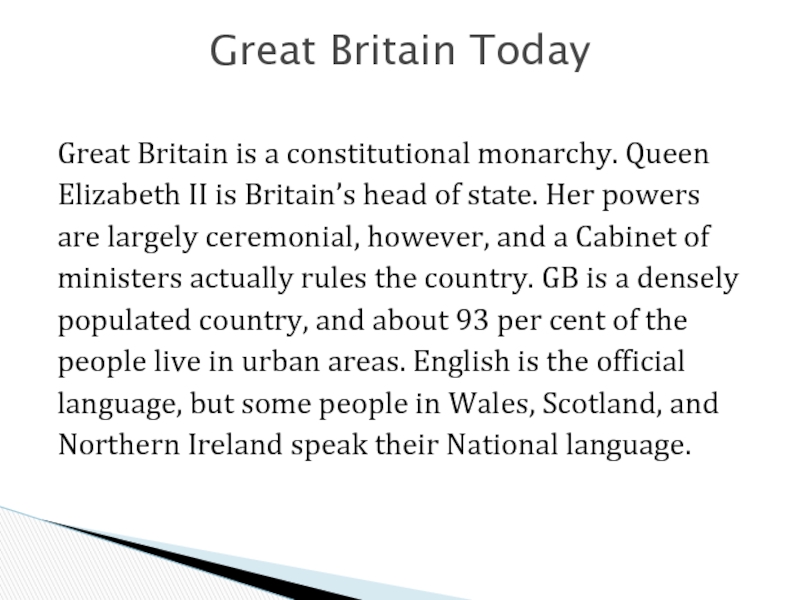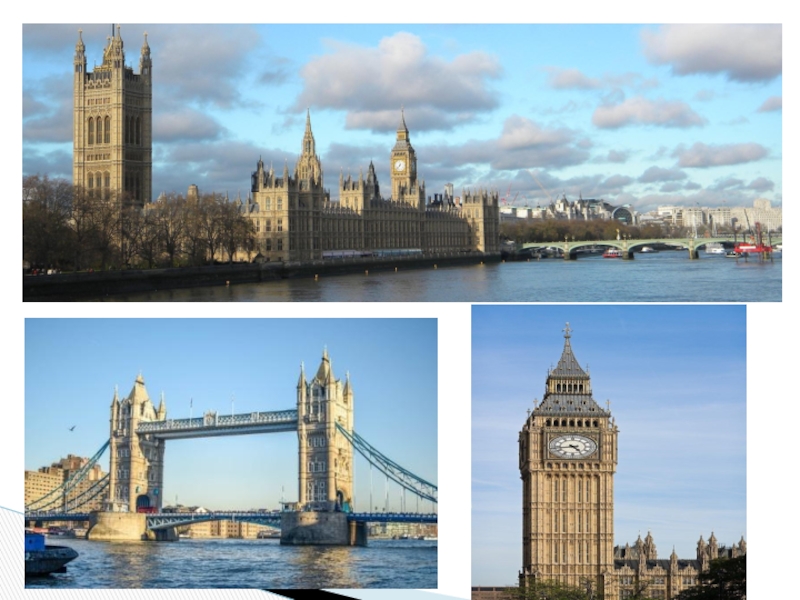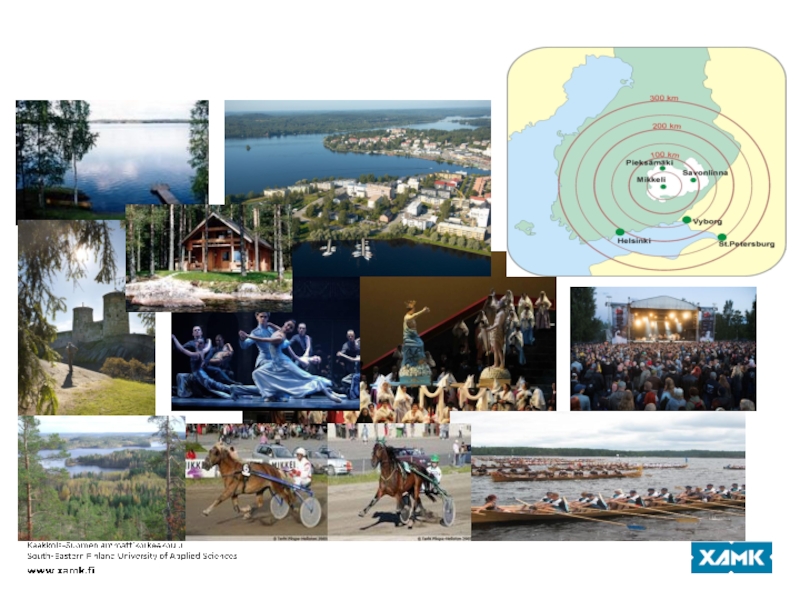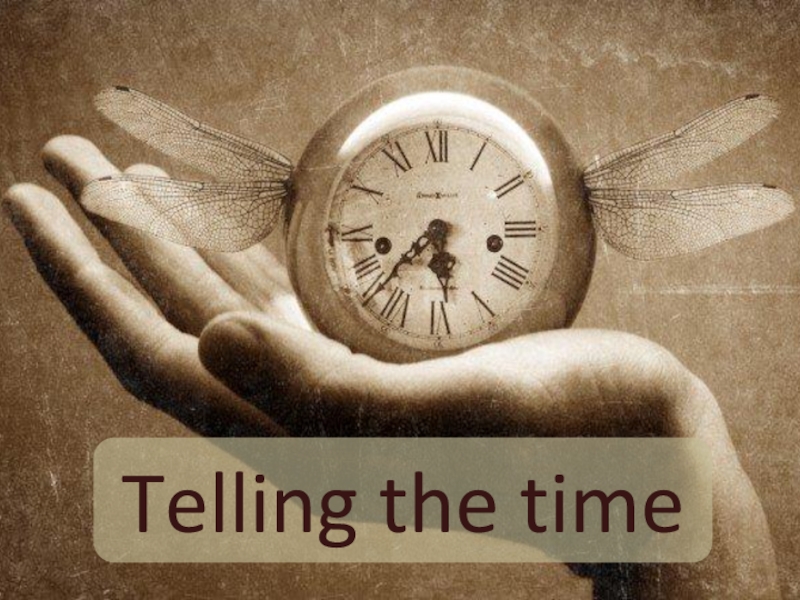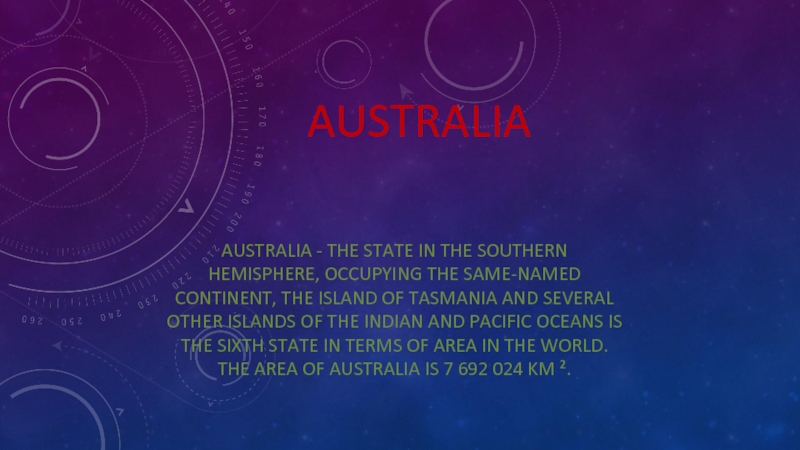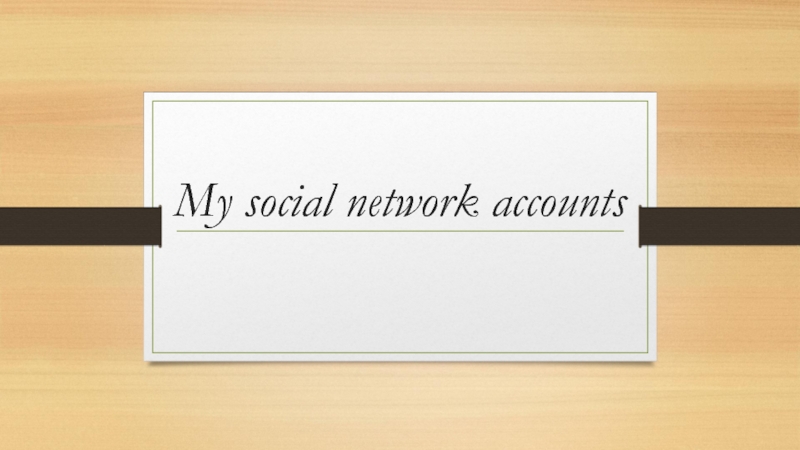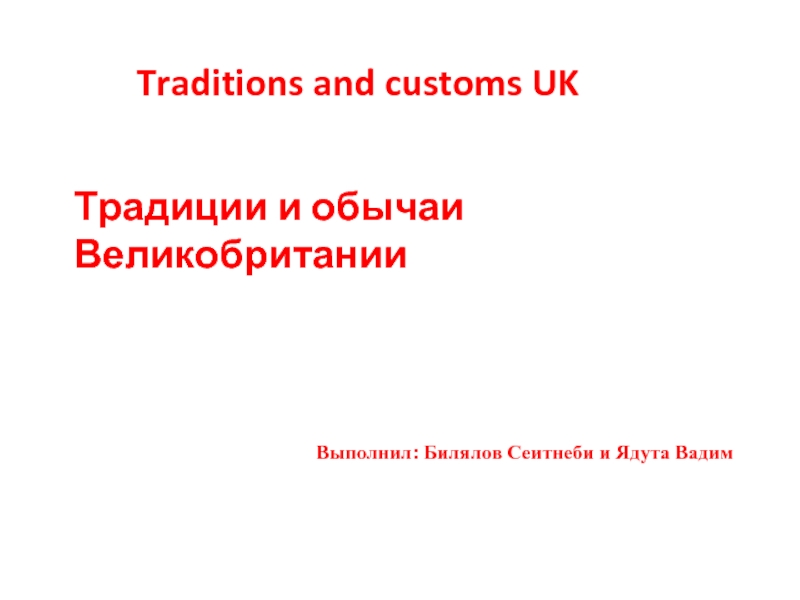- Главная
- Разное
- Дизайн
- Бизнес и предпринимательство
- Аналитика
- Образование
- Развлечения
- Красота и здоровье
- Финансы
- Государство
- Путешествия
- Спорт
- Недвижимость
- Армия
- Графика
- Культурология
- Еда и кулинария
- Лингвистика
- Английский язык
- Астрономия
- Алгебра
- Биология
- География
- Детские презентации
- Информатика
- История
- Литература
- Маркетинг
- Математика
- Медицина
- Менеджмент
- Музыка
- МХК
- Немецкий язык
- ОБЖ
- Обществознание
- Окружающий мир
- Педагогика
- Русский язык
- Технология
- Физика
- Философия
- Химия
- Шаблоны, картинки для презентаций
- Экология
- Экономика
- Юриспруденция
History of Great Britain презентация
Содержание
- 1. History of Great Britain
- 2. Plan 1. History of the United
- 3. The history of the United Kingdom as a unified sovereign
- 4. The Kingdom of Great Britain came into being
- 5. The Seven Years War, which began in 1756,
- 6. During the first half of the 18th
- 7. Victoria became queen in 1837 at age 18.
- 8. A British expeditionary force was immediately sent
- 9. Memories of World War I left Britons
- 10. Great Britain is a constitutional monarchy. Queen Elizabeth
Слайд 1History of Great Britain
Подготовили: Касанова Аяулым, Дасаева Жания, Шеркешбаева Аяжан
Иностранный язык: два иностранных языка
Слайд 2Plan
1. History of the United Kingdom
2. Birth of the Union
3.
4. Population Growth, Urbanization, and
Industrialization
5. Victorian era
6. Britain in World War I
7. Britain and World War II
8. Great Britain Today
Слайд 3The history of the United Kingdom as a unified sovereign
state began in 1707 with
of England and Scotland, into a united Kingdom called Great
Britain. The Act of Union 1800 added the Kingdom of
Ireland to create the United Kingdom of Great Britain
and Ireland.
In 1927 the United Kingdom changed its formal title to
the United Kingdom of Great Britain and Northern
Ireland, usually shortened to Britain and (after 1945) to
the United Kingdom or UK.
History of the United Kingdom
Слайд 4The Kingdom of Great Britain came into being
on 1 May 1707, as
union of the Kingdom of England and the Kingdom of
Scotland according to the Treaty of Union. It enabled
the two kingdoms to be combined into a single
kingdom, merging the two parliaments into a
single parliament of Great Britain. Queen Anne
became the first monarch of the new Great Britain.
Birth of the Union
Слайд 5The Seven Years War, which began in 1756, was the first war
waged on a global scale, fought in Europe, India, North America,
the Caribbean, the Philippines and coastal Africa. The signing of
the Treaty of Paris (1763) had important consequences for
Britain and its empire. In North America, France's future as a
colonial power there was effectively ended with the ceding
of New France to Britain (leaving a sizeable French-speaking
population under British control) and Louisiana to Spain. Spain
ceded Florida to Britain. In India, the Carnatic War had left
France still in control of its enclaves but with military
restrictions and an obligation to support British client states,
effectively leaving the future of India to Britain. The British victory
over France in the Seven Years' War therefore left Britain as the
world's dominant colonial power.
British Empire
Слайд 6During the first half of the 18th century, the population of
increased by less than 15 percent. Between 1751 and 1801, the year of the
first official census, the number rose by one-half to 16 million, and between
1801 and 1851, the population grew by more than two-thirds to 27
million. The reasons include a decline of deaths from infectious diseases,
especially smallpox; an improved diet made possible by more efficient
farming practices and the large-scale use of the potato; and earlier marriages
and larger families, especially in those areas where new industries were
starting up. Between 1760 and 1830 the production of cotton textiles
Increased twelvefold, making the product Britain’s leading export.
Population Growth, Urbanization, and Industrialization
Слайд 7Victoria became queen in 1837 at age 18. Her long reign
until
and political power. Exciting new technologies such as
steam ships, railroads, photography, and telegraphs
appeared, making the world much faster-paced. Britain
again remained mostly inactive in Continental politics, and
it was not affected by the wave of revolutions in 1848. The
Victorian era saw the fleshing out of the second British
Empire. Historians like Bernard Porter have characterized
the mid-Victorian era, (1850–1870) as Britain's “Golden
Years”.
Victorian era
Слайд 8A British expeditionary force was immediately sent to
France and helped
Marne. Fighting on the Western Front soon became
mired in a bloody stalemate amid muddy trenches,
barbed wire, and machine-gun emplacements. Battles
to push the Germans back failed repeatedly at the cost
of tens of thousands of lives. Efforts to outflank the
Central Powers in the Balkans, as at Gallipoli (1915), failed
also. At the Battle of Jutland (1916), the British prevented the
German fleet from venturing into the North Sea and beyond,
but German submarines threatened Britain with starvation
early in 1917; merchant-ship convoys guarded by destroyers
helped avert that danger.
Britain in World War I
Слайд 9Memories of World War I left Britons with an overwhelming desire
to avoid another war, and the country played a leading role in the
League of Nations and at interwar disarmament conferences such
as those in Washington, D.C. in 1921 and 1922 and London in
1930 that limited naval size. Conscious that Germany might have
been unfairly treated at the 1919 peace conference, the British
government followed a policy of appeasement in dealing with Adolf
Hitler’s Germany after 1933. German invasion plan was foiled by
British air supremacy, large parts of London and other cities were
destroyed and some 60,000 civilians were killed. Beginning early in
1941, the still-neutral United States granted lend-lease aid to
Britain. German invasion plan was foiled by British air supremacy,
large parts of London and other cities were destroyed and some
60,000 civilians were killed. Beginning early in 1941, the still-
neutral United States granted lend-lease aid to Britain.
Britain and World War II
Слайд 10Great Britain is a constitutional monarchy. Queen
Elizabeth II is Britain’s head of
are largely ceremonial, however, and a Cabinet of
ministers actually rules the country. GB is a densely
populated country, and about 93 per cent of the
people live in urban areas. English is the official
language, but some people in Wales, Scotland, and
Northern Ireland speak their National language.
Great Britain Today
